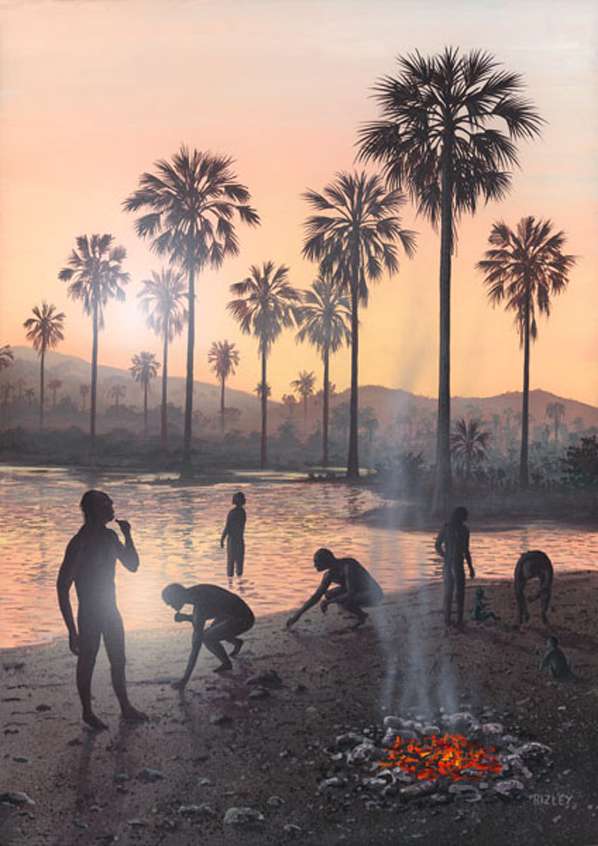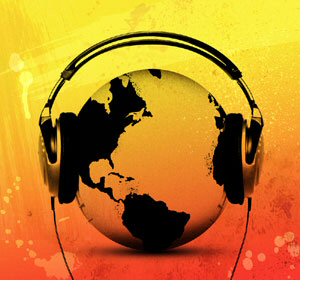
Scene #1:
The alpha tribesperson gets up in front of the group and delivers what appears to be a significant, inspired message. Unfortunately, language hasn't been developed yet so the audience can only nod obsequiously, careful not to offend their leader. Everyone tries to avoid these encounters, their motivation being intimidation, boredom or the lingering suspicion that the speaker is full of shit.

Scene #2:
Soon after establishing a common language the primordials gather around the campfire. Experience being limited, there is a paucity of material, such that separate members end up telling the same story. Plotlines that survive long enough become part of that group's culture, history, religion and lore. The entertainment comes in the different ways these speakers relate the same events. This is the basis of prose. Occasionally, a performer "nails it" so perfectly that the audience decides to preserve that rendition intact by memorizing it. That is the basis of poetry.
Ramifications of Scene #1:

This is history reminding us what happens when we lose our audience. It doesn't really matter what the cause: babble instead of communication, competition, boredom, lack of tools, venues or media, et cetera. When audiences exhibit the "good night" response, fleeing if they can, sleeping if they must, a predictable set of interdependent circumstances unfolds:
- the art form is defined by its producers;
...since there are no consumers. - the art form is indistinguishable from prose;
Why worry about form when no one is watching? - authorities monopolize the podium;
This is almost tautological since, by definition, authorities monopolize everything. Apathy makes their job easier, though. No one is going to storm the stage to grab the microphone and speak to the crowd when there is no mic, no language and, above all, no crowd. Just as despots avoid or rig elections they can't win, the absence of an audience serves the purpose of authorities who lack the language to please one. - a knee-jerk reaction to popularism reigns;
If the audience were comprised of the society's more sophisticated members might not the distinction between popularism and meritocracy become blurred? Even if/when all language is reduced to onomatopoeia, authorities won't want to see a cult of personality grow around, say, the best bird-caller. - criticism becomes unthinkable;
A tribe is a small community; those hoping to address it rate to be smaller still in number. Forget criticism; even disapproval would be considered antisocial, if not downright treasonous. Besides, what would be the basis of criticism in an environment where technique hasn't been studied and, lacking a contemporary canon of icons, no standards for excellence have been set? It follows logically that, in this culture of nods and blurbs: - the lack of iconic examples is no coincidence;
The insignificance of the text, coupled with indiscriminate praise, ensures that neither a meritocracy nor a prosody can take hold. - the speakers remain convinced that their utterances are vital and profound;
...while, in truth, such blatherings are too incoherent for prose and too dull for poetry. In many cultures language may have been inspired by the burning need of "poets" to discover that they weren't, in fact, poets. - humorlessness;
Authorities would be keenly aware that humor would include parodies of their performances. This being the case, humor would be limited to dessicated intertextual allusions--gibberish congratulating other gibberish. - solipsism;
Speaking a language no one else understands and with no one else listening, why discuss anything beyond the speaker's own concerns? - contempt for audiences;
...whose inability to understand nonsense is, of course, entirely their own fault. - a pall is cast on all attempts at communication;
The tribe becomes more insular, suspicious of speech itself. Thus, a case is made against language. Fortunately, we have a Catch-22: that case can't be articulated. - and, as the bottom line: in the absence of an audience speakers compete to be the most conspicuously ignored.
Worse yet, the language doesn't exist to describe exactly how hollow such a victory is...and how integral an audience is to any form of communication.
Does any of this sound familiar to you?
Ramifications of Scene #2:

While Scene #1 may be of greater interest to those invested in the post-WWI poetry world, it is Scene #2 that strikes at the definition of poetry as memorable speech, not necessarily rhythmic speech.
- Poets didn't create poetry. Audiences did.
These audiences weren't mere arbiters, declaring that this is prose while that is poetry, good or bad. Their efforts to preserve the words in memory was, itself, what changed performances into poems. Poetry didn't merely respect the audience; it was the audience. - Posterity honors the best, not the first.
The version that caught on with listeners might have been the seventh as easily as the first. This illustrates how content regency is a mug's game. Even if we come up with something new under the sun someone can come along, say it better and we're SOL. Altogether now:- It ain't about what you say.
- It ain't about how you say it.
- It's about how well you say it.
- Poetry was prose.
Given that techniques and forms weren't developed yet, poetry was originally identical to prose. Something was a poem solely because it was preserved intact by listeners. Some could spin the current fashion, prose qua poetry, as a return to poetry's roots. Others could describe it as the original failed aesthetic, prosody replacing it with prose poetry, free verse and then meter. The latter group may be inclined to describe post-WWI poetry as a devolution from meter to free verse to prose poetry to prose. - Poems were iconic.
By definition. - Poetry was never as much fun as song.
People really don't listen to song lyrics. Atheists have their favorite hymns while believers sing along to Lennon's "Imagine". Clearly, people aren't taking the message of these songs seriously.
As a medium, poetry is more persuasive, more like rhetoric than lyrics. Most prefer to be entertained than persuaded, though. As long as beach parties draw greater crowds than political parties poetry will take a back seat to song. - Poetry thrived in Apollonian, authoritarian and puritanical environments.
Most primitive societies probably fit this bill, with power resting in the hands of the strongest and/or the most capable of providing food.
Compare the Georgian and Victorian generations--the last in which verse reigned--to the speakeasy flappers of the 1920s, when poetry died. Until the Depression kicked in the post-WWI era was Dionysian, democratic (e.g. universal suffrage), and, obviously, more sexually liberated than the decades before the war. Let's take these three in order:- Many poets have been dipsomaniacs but few qualified as Dionysian "party animals"; most were either mean drunks or quiet ones.
- Anyone who has survived an open mic understands the price that democracy brings to poetry. Does a grass roots approach produce better art? One need look no further than our recent leaders to know that democracy and meritocracy are two very different things.
- As for puritanism, poetry served well as a way of flirting, even in the presence of parents, when daughters weren't allowed out of sight. How many of us owe our lineage's existence to poetry?
- Many poets have been dipsomaniacs but few qualified as Dionysian "party animals"; most were either mean drunks or quiet ones.
- Poetry was, by definition, elitist.
Thousands of performances might result in one poem. Just as the perfection of an endeavor destroys it (e.g. there are no tic-tac-toe championships), that poem would become the only version of that story and was not to be paraphrased. There were no bad poems; why bother memorizing mediocrity? In theory at least, the worst poem was better than the best prose. Poets were often venerated. In every sense, aspect and stage, then, poetry was elitist. - Comedy was king.
Even in the strictest hierarchical societies exceptions would have been made for anyone who could make people laugh--at least as long as they weren't laughing openly at authority figures! To this day, an unknown poet's best chance of publication comes with light verse, especially if intending to publish in more lucrative and numerous non-literary outlets. - The expression "forgettable poetry" was an oxymoron.
Today it is the standard.









